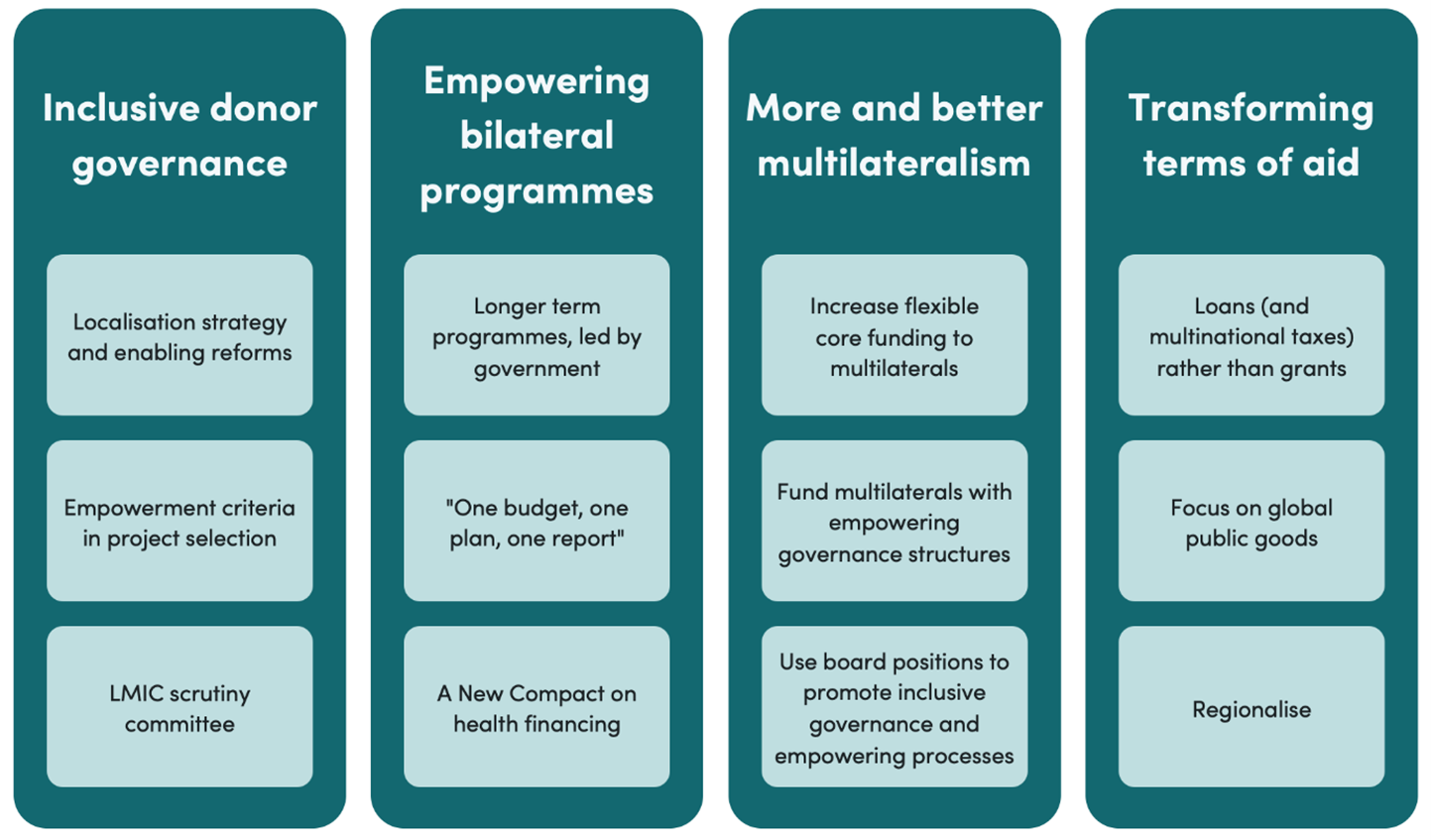April 06, 2009
Members of the Senate Foreign Relations Subcommittee on International Development held a hearing last week on “USAID in the 21st Century: What Do We Need for the Task at Hand?” CGD senior fellow Steve Radelet, Georgetown professor and CGD visiting fellow Carol Lancaster and former USAID administrator Andrew Natsios testified and gave their answer: an autonomous U.S. development voice, strong leadership, and new legislation.Sen. Robert Menendez (D-NJ), chairman of the Senate Foreign Relations Subcommittee on International Development, Foreign Assistance, Economic Affairs and International Environmental Protection set the tone of the hearing in his opening statement, saying reform of our development programs are clearly in the national security interest of the United States and just as the military transformed itself after the fall of the Soviet Union, so too should our development agency in order to stay nimble, responsive and ahead of the curve. He said: Sen. Bob Corker (R-TN), ranking member on the subcommittee, said USAID often plays “second fiddle” risking “too much focus on the urgent and not the important.” He said Congress has been irresponsible and has layered development programs with political views making development efforts less effective than they should be.The three witnesses at the hearing expressed similar views. Carol Lancaster, professor of politics at Georgetown University’s Mortara Center for International Studies and CGD visiting fellow said in her testimony that her greatest concern about the future of USAID is where it is now located: integrated into the Department of State. She said:
Sen. Bob Corker (R-TN), ranking member on the subcommittee, said USAID often plays “second fiddle” risking “too much focus on the urgent and not the important.” He said Congress has been irresponsible and has layered development programs with political views making development efforts less effective than they should be.The three witnesses at the hearing expressed similar views. Carol Lancaster, professor of politics at Georgetown University’s Mortara Center for International Studies and CGD visiting fellow said in her testimony that her greatest concern about the future of USAID is where it is now located: integrated into the Department of State. She said: Former USAID administrator Andrew Natsios, who led the agency from 2001 to 2005 under President George W. Bush, said in his testimony that USAID’s organizational association with the State Department conflates development and diplomacy programs. He said:
Former USAID administrator Andrew Natsios, who led the agency from 2001 to 2005 under President George W. Bush, said in his testimony that USAID’s organizational association with the State Department conflates development and diplomacy programs. He said:
One way to start us along this path is to focus on USAID’s leadership. It needs credible and high-profile leadership that can work in partnership with the Congress, the Department of State, the Department of Defense, and the National Security Council. The “development voice” in our government needs to be a “heavyweight voice” that commands respect both in Washington and around the world. This voice needs to be a counterpart to diplomacy, not a subset.
 Sen. Bob Corker (R-TN), ranking member on the subcommittee, said USAID often plays “second fiddle” risking “too much focus on the urgent and not the important.” He said Congress has been irresponsible and has layered development programs with political views making development efforts less effective than they should be.The three witnesses at the hearing expressed similar views. Carol Lancaster, professor of politics at Georgetown University’s Mortara Center for International Studies and CGD visiting fellow said in her testimony that her greatest concern about the future of USAID is where it is now located: integrated into the Department of State. She said:
Sen. Bob Corker (R-TN), ranking member on the subcommittee, said USAID often plays “second fiddle” risking “too much focus on the urgent and not the important.” He said Congress has been irresponsible and has layered development programs with political views making development efforts less effective than they should be.The three witnesses at the hearing expressed similar views. Carol Lancaster, professor of politics at Georgetown University’s Mortara Center for International Studies and CGD visiting fellow said in her testimony that her greatest concern about the future of USAID is where it is now located: integrated into the Department of State. She said:Secretary Clinton understands the nature and importance of development better than any other Secretary of State I have observed or worked with. But Secretary Clinton is only one person and she will not be Secretary of State forever…The danger is that the more USAID is drawn into the State Department orbit, the more its development assistance programs and the more all U.S. aid programs become tools primarily of diplomacy. One key reason for this tendency is that not only USAID’s autonomy but its development voice will be lost. Indeed, its autonomy is already lost.
 Former USAID administrator Andrew Natsios, who led the agency from 2001 to 2005 under President George W. Bush, said in his testimony that USAID’s organizational association with the State Department conflates development and diplomacy programs. He said:
Former USAID administrator Andrew Natsios, who led the agency from 2001 to 2005 under President George W. Bush, said in his testimony that USAID’s organizational association with the State Department conflates development and diplomacy programs. He said:USAID and State are like oil and water. This is not an attack on the State Department. I served as a diplomat for a time and I must say I have great respect for our diplomats and for the fine work the State Department does around the world, but that work should not be confused with development. If the Congress intends on having a competent international development agency, its independent policy-making authority over the allocation of its budget with a direct line relationship to OMB should be restored and its business systems made once again independent. Structurally a reformed foreign aid agency should be organizationally independent of the State Department.Steve Radelet, CGD senior fellow and co-chair of the Modernizing Foreign Assistance Network, said in his prepared testimony that the U.S. development voice is like a choir without a conductor. He argued that the administration should name a “strong, capable leader as USAID administrator as soon as possible to exert leadership on development policy and transform USAID into a 21st century development agency.” (See also CGD senior policy analyst Sheila Herrling’s policy memo.) Radelet also made a plea for autonomy for U.S. development programs from the State Department:
Building a strong and effective development agency will require providing our development programs with a certain degree of autonomy from our diplomatic and defense efforts alongside distinct authority and responsibility over the development budget and policy.While development programs should be closely aligned with our overarching foreign policy objectives—diplomatic and defense—development is a distinct set of issues requiring very different professional skills and background to address economic development, poverty reduction and long-term management of development programs.Radelet said that better separation between State and USAID would help attract the right experts for each institution and ensure the development missions are not subordinated to short-term political pressures and diplomatic objectives of the State Department.Radelet also urged Congress to rewrite the outdated Foreign Assistance Act of 1961. He said:
The bottom line is that without a restructuring of authorities and a rationalization of restrictions, whether they be congressional earmarks or presidential directives, all the personnel and organization reforms undertaken will not make a truly material difference in the effectiveness of U.S. foreign assistance programs.Lancaster questioned the feasibility of the “huge political lift” that would be needed to rewrite the act in full but thought there might be ways to craft smaller authorizing legislation to improve the current system. Natsios didn’t comment specifically on rewriting the Foreign Assistance Act, but criticized sector earmarking of the development budget by executive and legislative branches as undermining local ownership and suggested the Congress give USAID mission directors authority to transfer ten percent or more of the country budget allocation from earmarks to respond to local priorities. He also suggested rewriting the Embassy Security Act to allow more USAID staff to get to the field and leave the embassy compounds more regularly.Senator Casey (D-PA) asked the witnesses how USAID, the Millennium Challenge Corporation (MCC) and the President’s Emergency Plan for AIDS Relief (PEPFAR) would be coordinated in a stronger, autonomous U.S. development agency. Lancaster noted the concern that PEPFAR funding could “absorb the rest of the budget” and Natsios said PEPFAR should be moved to USAID “where it properly belongs.” Radelet said PEPFAR and MCC were set up as separate programs because USAID was seen as a weak institution and that they shouldn’t all be combined today, but that a rebuilt USAID with strong leadership and autonomy would pave the way for the programs to be brought together.PEPFAR is widely regarded as a success among members of Congress and development experts, but what often goes unsaid is that the hallmarks of PEPFAR’s success—strong leadership, the ear of the president, bipartisan support, clear guiding legislation, robust funding and a large degree of authority over spending, and a strong focus on monitoring for results and impact—are the same attributes needed for the “task at hand” to make the whole of U.S. development programs a success. Let’s hope the latest hearing is another step in that direction.
Disclaimer
CGD blog posts reflect the views of the authors, drawing on prior research and experience in their areas of expertise. CGD is a nonpartisan, independent organization and does not take institutional positions.





